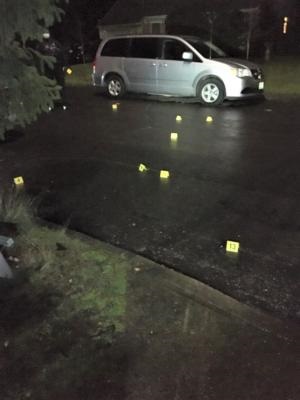 Post an Event
Post an Event
| Benton County Republicans’ Private Fundraising Event, “Bent-on Boots and Bling” with Trey Taylor |
| Friday, September 5, 2025 at 5:00 pm |
| Featuring Trey Taylor
Music Private Event
Friday, September 5, 2025 5:00-5:30 pm VIP Reception
5:30-8:00 pm Heavy Appetizers,
Auction, Concert
Red: $750 VIP Reception
Front Row Table Sponsor
White: $500 Table Sponsor
Blue: $50 per person
Limited Seating. Get Yours Now!!!
Support Local
Dress up: Bling, Cowboy, Patriotic Benton County Republican
FUNDRAISER
www.BentonGOP.org
Get your tickets today at:
https://www.bentongop.org/event-details/benton-county-republicans-fundraiser/form
About Trey:
Trey is the youngest African American Man in Country Music History. The Denver Post wrote
"It's impossible to miss his enthusiasm. With a fondness for cowboy boots, gaudy colors and dazzling jewelry, Trey Taylor could stand toe to toe with any of the Pop, Country or even Rap
contemporaries of his generation.“ |
| Trysting Tree Golf Club, 34028 NE Electric Rd., Corvallis |
The people deserve transparency
Republicans in Oregon are speaking up about manipulative tactics that are being used by the state's Governor Kate Brown and the Oregon Health Authority in regards to releasing information about coronavirus data.
Oregon House Republican Leader Christine Drazan (R-Canby) has issued a statement in response to the Oregon Health Authority’s decision to limit the release of critical COVID-19 information.
“Yesterday, the Oregon Health Authority announced suddenly that the agency would no
longer publicize key information related to COVID-19 deaths in Oregon. This
information has been released daily for months without incident and is critical to
allowing the public to understand how and who the virus is impacting.
“Oregonians have been asked to sacrifice so much in so many ways, they deserve access
to all relevant available information.
“The decision to suspend access to key information calls into question the Governor’s
commitment to transparency and accountability at a time when state-level decisions
have made Oregon a national outlier by ignoring CDC guidelines and dismissing a
science-based approach to vaccine distribution. In order to maintain trust and preserve
transparency, Governor Brown and OHA must reverse yesterday’s decision and commit
to providing clear, consistent and timely data in all categories moving forward."
--Bruce Armstrong| Post Date: 2021-01-31 15:10:15 | Last Update: 2021-01-31 19:10:31 |
Democrats seek to ban unregistered guns with hefty fines
In the Oregon Senate, Senator Floyd Prozanski (D-Eugene) and Senator James Manning Jr. (D-Eugene) are chief sponsors for
SB 396, a bill which "punishes manufacturing, importing, offering for sale or transferring undetectable firearm." If passed, this bill will decimate the part of the firearm industry that manufactures and sells undocumented receivers and lowers -- the basic working parts of firearms -- in the state of Oregon. Gun enthusiasts, hobbyists, and people who want to keep their anonymity, use these parts to assemble firearms that do not have serial numbers, therefore the state or federal government has no way of knowing these products exist. The term for these unlisted firearms is “ghost guns.â€
Many American citizens want to maintain their privacy and personal business from the intrusive and sometimes abusive eye of authority. From the British Arms Embargo of 1775 to the Brady Bill of 1993, or the Federal Assault Weapons Ban of 1994, Americans have a reason to be fearful of government and its ability to deny citizens their rights.
SB 396 defines “undetectable firearms,†“untraceable firearms,†and “unfinished frames or receivers,†then it imposes new punishments and fines for owning, producing, selling, or transferring these types of products.
If enacted, anyone who manufactures, imports, sells, or transfers an “undetectable firearm†could receive a maximum of 10 years in prison or a $250,000 fine or both. Anyone in possession of an “undetectable firearm†could receive 364 days in prison, a fine of $6, 250, or both. Anyone who manufactures, imports, possesses, sells, or transfers an “untraceable firearm†could receive a maximum of 10 years in prison, a fine of $250,000, or both.
SB 396 requires a gun dealer to conduct a criminal background check before the transfer of an “unfinished frame or receiver.†Anyone importing, selling, or transferring an “unfinished receiver†could receive a maximum of 10 years in prison, a fine of $250,000, or both.
A D V E R T I S E M E N T

A D V E R T I S E M E N T
There are even some special exceptions in the bill so that anyone who possesses an unserialized unfinished frame or receiver could receive a maximum of five years in prison, a fine of $125,000, or both. It provides that anyone in the possession of an unfinished frame or receiver who commits a crime could receive a maximum of 364 days in prison, a fine of $6,250, or both. It would also prohibit them from the Right of possessing firearms. These are pretty stiff penalties for not having a serial number registered with the government.
Information is power and those who defend the right to own an untraceable firearm contend that a government database or registry of firearms would be used as a powerful weapon against citizens, were the government ever to want to confiscate firearms -- something that has happened several times in history -- leading to loss of freedom. This bill is just the latest skirmish in the battle for Second Amendment rights.
--Rob Taylor| Post Date: 2021-01-31 11:04:08 | Last Update: 2021-01-31 11:32:54 |
Employers are not medical professionals
Governor Kate Brown eased her lockdown on gyms and recreation. Stores providing food have never been shutdown and, at worst, were limited to 75% capacity, which is technically no limit. But, they have been empowered to protect their business through intimidation, threats, bullying, and physical blockage to keep customers from entering a store if not wearing a mask.
Such was the case last week when Northwest Observer was notified of threats at the Albany Wal-Mart. When Loma Wharton approached the store, a male employee followed her into the store while calling a “Front End Manager†who informed her that if she did not put a mask on, she would call the police.
Wharton has health issues, and she is fully aware that the Oregon Health Authority guidelines say she should not be made to wear a mask. “If you have a medical condition that makes it hard to breathe or a disability that prevents you from wearing a mask, you can request an accommodation from the business or venue or transit authority.â€
Wharton researched her rights and was prepared for any business questioning her. She stopped at the entrance and filled out a document she brought with her. The document reads:
“There is no law in Oregon, State, County, or City that requires citizens to wear a mask either in public or in business establishments, nor is there a regulation to require employees or patrons of those establishments to wear a mask.†All that exists is an edict from the Governor of Oregon, who has no authority over any of these matters. See the following:
American Federation of State, County, and Municipal Employees v. Olson, 338 N.W.2d 97 (N.D. 1983): “It is well settled that public officials have only such authority as is expressly given them by the constitution and statutes together with those powers and duties which are necessarily implied from the express grant of authority,†338 N.W.2d, at 100.
In re Benny, 29 B.R. 754, 762 (N.D. Cal. 1983): “[A]m unlawful or unauthorized exercise of power does not become legitimated or authorized by reason of habitude.â€
An Oregon Revised Statute does exist that prohibits public businesses from discriminating against those who do not wear a mask. I suggest you read ORS 659A.142. “Discrimination against individual with disability by employment agency, labor organization, place of public accommodation or state government prohibited.â€
Employers are not law enforcement agents and have no authority to act as such.
Employers are not medical professionals and have no authority to administer a medical examination or give medical advice, including advice to wear a mask.
If a public business, in the case Wal-Mart refuses entry into its facility for not wearing a mask for health reasons, they are in violation of the Oregon Constitution, which protects free movement against false imprisonment.
No Business is required to comply with a policy that violates Oregon law or my Rights guaranteed under the Oregon Constitution.
Laws are created by legislative bodies such as Congress or the Oregon State Legislature, not Governor Brown. Governors and mayors cannot enact laws. Their executive orders are binding only on government employees and contractors under their jurisdiction.
Wharton attempted to hand the signed document to the Front End Manager, but she refused to take it claiming to be a private company. The Front End Manager didn’t ask her to leave the store, but was threatening. If the police had come, her plan was to site their violation of ORS 659A.142, discrimination against individual with disability by place of public accommodation by forcing her to wear a mask or arrest her.
Wharton has since sent the document to Paul Redman, Wal-Mart Store Manager, relaying the incident and her restraint from entering the store, which forced her to wait in the car for family to do her shopping. She said, “It is obvious Wal-Mart does not know Oregon Laws and puts their employees, and Wal-Mart itself at great risk for being sued by enforcing an unlawful unconstitutional edict from Governor Brown.â€
The Oregon State Legislature has introduced fifteen bills protecting the rights of the disabled, but none address the mistreatment that disabled people are reporting - keeping them out of public places for failure to wear masks.
--Donna Bleiler| Post Date: 2021-01-30 18:34:50 | Last Update: 2021-01-30 19:24:10 |
But, it’s, like, still open.
The controversial decision to close the Capitol during the 2021 legislative session has been questioned by some lawmakers since the beginning of the session. Legislative leadership, in the hands of Democrats has been unwilling to let the public in the building, a decision which some have noted, has the effect of letting them make laws without having to actually face the citizens of the State.
Indeed, Representative Mike Nearman (R-Independence) is under fire for exiting a door, which allegedly permitted several people to temporarily enter the Capitol, leading to safety measures being imposed on him and restricting his ability to enter the building.
In light of these restrictions, State Representative Mark Owens (R-Crane) asked for a legal
opinion from Legislative Counsel -- the official lawyers for the Legislative Branch -- on the question of the legality of closing the Capitol. In their analysis, Legislative Counsel offered a decision based in part on their understanding of how the disease is transmitted.
Because the virus that causes COVID-19 is transmitted through the air and between people who are in close proximity, the Legislative Assembly’s decision to keep the Capitol physically closed to the public while requiring contemporaneous broadcast of all legislative proceedings is not an arbitrary or unreasonable decision, and does not go beyond what is reasonably necessary to enable the legislature to make urgent policy decisions pertaining to the state’s response to the virus and other urgent matters.
In their conclusion, they answered several specific questions asked by Representative Owens, including "Is it legal to close off physical access by the public to the Capitol building for committee meetings and floor sessions? How does that impact public participation?"
Answer: We conclude that it is legal to limit physical access to the Capitol building during the COVID-19 pandemic, for the reasons described in “Overview†above. Public participation in the legislative process is preserved because House and Senate rules require the public to be able to observe legislative proceedings as the proceedings are occurring, and to be allowed to testify, using electronic means, when legislative committees conduct public hearings.
Interestingly, Legislative Counsel uses "transmitted through the air and between people who are in close proximity" as much of the justification for closing the Capitol -- more a biological and medical analysis than a legal one -- a justification which almost comically flies in the face of currently allowed practices throughout the state. It would be interesting to see how many Legislators who support the closure of the Capitol based on the transmissibility of the disease, frequent Costco, Fred Meyer, Wal-Mart or other places in which people are in even closer proximity than they are in the Capitol. Legislative Counsel seems to be at peace with this double standard.
Additionally, the Legislative Counsel opinion doesn't really address the second part of Representative Owens' question, "How does this impact public participation?" and leave a critical issue on the table, which is, what is the value of live public participation?
In
State v. Jackson the Oregon Court of Appeals heard a case in which a defendant who committed a crime inside a prison, was tried inside a prison, as the trial was simulcast to a publicly accessible courtroom outside the prison -- a circumstance that significantly mirrors the "open to the public" standard of the current rules in place at the Legislature. In this case, the conviction was remanded, interestingly, because of some of the psychological aspects of how actual live presence can impact the outcome of the proceedings. The Appeals Court listed three examples:
First, it noted that the exclusion of the public "tends to impress the jury with the enormity of the offense for which the accused is to be tried." Second, it noted that a spectator at a trial might hear testimony that would cause the spectator to "recall facts to which he will call attention, and thus aid in establishing the innocence of the accused." Third, the court concluded that the presence of friends and supporters of a criminal defendant could serve to offset the prejudice incident to being charged with a crime. Finally, the court noted that the presence of friends and supporters of witnesses could "enable the court and jury to elicit from that witness the testimony to which the defense or prosecution is entitled."
Amazingly, Legislative Counsel failed to consider this case, which bears on Representative Owens' point that live public participation
does have an impact on the process. Instead, Legislative Counsel rests on how they think the disease is transmitted.
--Staff Reports| Post Date: 2021-01-30 17:27:13 | Last Update: 2021-01-30 18:34:50 |
Incident was two days after Beachie Creek Fire
On September 14, 2020 Detectives from the Oregon State Police Arson Section responded to the 33000 block of North Fork Road to assist the Marion County Sheriff’s Office and the Stayton Fire Department with an arson investigation.
On January 29, 2021 Detectives arrested William (Dale) Hopson (48) of Lyons for Burglary, Criminal Trespass, Arson, Criminal Mischief and Reckless Endangering. He was lodged at the Marion County Jail and is expected to be arraigned on February 1, 2021.
Investigation revealed that on September 9, 2020, two days after the initial Beachie Creek Fire (September 7, 2020) burned through the Detroit, Gates, Mill City and Lyons areas, Hopson returned to the area and intentionally set fire to his neighbors residence.
Hopson and the neighbor’s residence had not been damaged by the Beachie Creek Fire.
--Ben Fisher| Post Date: 2021-01-30 08:35:44 | Last Update: 2021-01-30 13:06:02 |
A second try at organizing Legislative workers
Last fall, the Washington State based International Brotherhood of Electrical Workers Local 89
made an attempt to organize Oregon's Legislative branch workers. The Oregon Department of justice objected to the formation of a union on several grounds. In brief, those objections asserted that:
(1) recognizing the proposed bargaining unit would violate the separation of powers doctrine found in Article III, section 1 of the Oregon Constitution;
(2) the Public Employees Collective Bargaining Act (PECBA) does not provide for collective bargaining representation within the Legislative branch;
(3) the proposed bargaining unit was improperly defined; and
(4) the number of employees included in the proposed bargaining unit – and the number that signed valid union authorization cards – was questionable.
The Freedom Foundation has sent a
letter to the Department of Justice, the Employment Relations Board and other impacted parties, reminding them that these objections are still valid, and need to be considered:
First, the Legislative Assembly raised crucial objections as to the legality of this petition under both the separation of powers doctrine of the Oregon Constitution and the state PECBA. Because the Legislative Assembly’s initial objections were dropped when RC-010-20 was withdrawn by IBEW, neither question has been answered – and it is crucial that they are. Notwithstanding any relevant objections presented to the ERB, the question of constitutionality should be pursued vigorously through the legal system and ultimately answered by the state courts.
Second, IBEW’s revisions to the proposed bargaining unit do not resolve the myriad of problems identified by your office with the appropriateness of that unit. For example, RC-001-21 now limits the bargaining unit description to various legislative assistants (LAs) and broadly excludes “supervisory, managerial, confidential and caucus employees.†However, such generalities were something the Legislative Assembly specifically objected to in Case No. RC-010-20 (namely, that a similar description was insufficiently broad due to legislators’ unique ability to designate their employees – including LAs – as any one of 90 potential classifications based on their
individually assigned job duties, which can include “chief of staff†or other informal roles with supervisory, managerial, or confidential duties). Consequently, the Legislative Assembly’s associated concerns about the number of employees in the proposed unit – and the accuracy of those who may have signed union authorization cards pursuant to ORS 243.682(2) – have also not been addressed.
Unsaid in the letter is the suspicion that the re-filing clears the objections off the table and provides a clear path for the unionization of the Legislative workers. A decision from the Employment Relations Board is expected sometime in February.
--Staff Reports| Post Date: 2021-01-29 16:56:52 | Last Update: 2021-01-29 17:58:28 |
Proposal gives parents some wiggle room while still protecting young children
Did you know that you or someone you know could be guilty of second-degree child neglect?
SB 368 introduced by Senator Brian Boquist (R-Dallas) aims to modify that law bringing protection to some parents and independence to some young children.
SB 368 looks to modify Oregon law
ORS 163.545 which says “A person having custody or control of a child under 10 years of age commits the crime of child neglect in the second degree if, with criminal negligence, the person leaves the child unattended in or at any place for such period of time as may be likely to endanger the health or welfare of such childâ€.
Children mature at different ages, but is the blanket statement that 10 year-olds are too young to be engaged in independent activities or left alone accurate? A 2019 article in The Mercury News cited that by age 13, 83 percent of kids have their own cell phone and a widely cited 2016 report by Influence Central put the average age for a child to get a cell phone at about 10. In other words, kids can be trusted with a smart phone that can access all sorts of things on the internet but not to engage in unsupervised activities.
Senator Boquist proposes to modify that statute to give parents some wiggle room while still protecting young children. The bill would allow parents to decide if their child is mature enough to engage in specific activities independently: The bill proposes the following be allowed to be unsupervised:
(a)Walking, running or bicycling to or from school or nearby commercial or recreational facilities;
(b) Engaging in outdoor play;
(c) Remaining in a vehicle unattended;
(d) Remaining at home unattended; or
(e) Engaging in a similar independent activity
--Terese Humboldt| Post Date: 2021-01-29 16:42:32 | |
Some are about taxing
Often bills are introduced that “direct ______ state agency to conduct a study to examine_____.†Back during the 2019 Session,
HB 3427 was introduced by the Committee on Rules. It “Directed the Department of Education to conduct a study to examine best methods for funding state’s system of K-12 public educationâ€. By May 16, 2019, the “study†had become Oregon’s newest tax, the Corporate Activity Tax or CAT.
The original one-page bill became 40 pages and passed out of committee and off both floors on a straight party line vote. The Republicans could not stop or even slow down the super-majority. There were 14 amendments brought to the committees and over 30 were drafted. None of the Republican sponsored amendments were adopted. At the end of the day, the “study bill†became Oregon’s newest tax pushed through by the supermajority.
Since the 2019 session, multiple business sectors from pharmacies to agriculture, Automobile dealers to mobile home park operators have come before the legislature at every opportunity possible seeking to carve out their business from the harmful impacts of the “study billâ€. Small changes have been made and carve outs continue to be requested.
As of press time, there were 234 bills introduced, so far, in the House and the Senate that direct _____ state agency to study________ and report back to the legislature. Some of the bills are transparent and state that the agency is to study a current tax or a possible future tax or a specific issue, but other proposed studies are much more vague like
HB 3427 was in 2019.
--Terese Humboldt| Post Date: 2021-01-29 16:32:34 | Last Update: 2021-01-29 16:42:32 |
Comments may be submitted until March
Per
OAR 845-015-0138, the Oregon Liquor Control Commission will consider any written or verbal comments before implementing such a price increase.
Public Action:
The Commissioners of the Oregon Liquor Control Commission will accept written and verbal public comment on the proposed implementation of setting a minimum price. The proposal sets the price by proof and bottle (container) size using a consistent proof base value per container size. No distilled spirit bottle shall be sold for less than the established minimum price.
It is argued by some that the setting of minimum prices can contribute to decreased social harms and adverse health impacts.
Written Public Comment:
Written comments can be
submitted online beginning January 29th, 2021, through March 15th, 2021, at 5:00 PM.
You may also do so via mail to:
Restricting second amendment not the answer
During the evening and overnight hours, Portland Police officers responded to multiple shootings throughout the city of Portland, Oregon.
On Wednesday, January 27, 2021 at 4:50p.m., North Precinct officers responded to a report of shots heard in the 15900 block of Northeast Fremont Street. Officers confirmed that an occupied vehicle was hit with gunfire. At least one occupied apartment was also struck by bullets (21-24790). No one was hurt.
At 9:34p.m., Portland East Precinct officers were dispatched to a report of shots fired near Southeast 122nd Avenue and Southeast Salmon Street. Witnesses described two vehicles driving northbound where occupants appeared to be shooting at each other. Some evidence was recovered. No known injuries.
At 11:37p.m., North Precinct officers were dispatched to a report of someone shot at a house in the 1800 block of Northeast Marine Drive. They arrived and located a victim with serious injuries, who was transported to a hospital. Assault Detectives are investigating (21-25047).
On Thursday, January 28, 2021 at 12:30a.m., North Precinct officers were dispatched to a report of a shooting in the 9100 block of North Mohawk Avenue. They discovered that a suspect fired one round at someone from a vehicle and drove away (21-25118). No injuries reported.
At 3:20a.m., East Precinct officers were dispatched to a report of shots heard in the 100 block of Northeast 129th Avenue. When the arrived they located evidence of gunfire. They checked area homes and found at least one hit by bullets that was occupied by a mom and her two kids. No one was injured. Several parked cars were struck. A gun was also found at the scene (photos, 21-25144). No known injuries.
At 4:38a.m., North Precinct officers responded to a shooting in the 9500 block of North Buchanan Avenue that resulted in the
death of a victim.
At 8:00a.m., officers from Central Precinct responded to the 3100 block of Southeast McLoughlin Boulevard on a report of a shot fired through a window. It was not confirmed whether it was a bullet or some other kind of projectile.
With these events, there have been over 80 shooting incidents so far this year.
All of these cases are under investigation. Detectives are doing follow-up, gathering evidence, and looking for more witnesses. But it's critical that help comes from the community to address this problem. Those who have surveillance systems in the area of these events are asked to review footage and reach out if anything of evidentiary value was captured.
--Ben Fisher| Post Date: 2021-01-29 15:15:19 | Last Update: 2021-01-29 15:29:54 |
Brown is redirecting 32,000 vaccines from rural Oregon to Portland
Republican Legislative leaders Representative Christine Drazan (R-Canby) and Senator Fred Girod (R-Lyons) responded to the Governor’s decision to send 32,000 additional vaccines to Portland, once again prioritizing urban Oregon over the needs of rural Oregon:
“Without public input, the Governor’s announcement that she is redirecting 32,000 vaccines from rural Oregon to Portland is troubling. Cities and counties across the state, who have faced the brunt of the Governor’s shutdown orders, carefully planned to safely vaccinate their communities have suddenly had their allocations redirected. This is an insult to them and unfair to their communities.
“First, the Emergency Board unfairly allocated federal COVID relief money to prioritize Portland. Now this. At a time when we should be uniting as a state, the Governor is picking winners and losers and once again punishing rural Oregon.â€
Governor Brown has been under fire for prioritizing vaccines for public employee unions who have supported her over elderly persons, who have a higher chance of dying of COVID-19
--Staff Reports| Post Date: 2021-01-29 10:04:55 | |
Projectiles thrown and burning dumpster used by crowd
On January 27, 2021, at approximately 9:51 p.m., a large group that had gathered outside of the Immigration and Customs Enforcement (ICE) offices in the 4300 block of South Macadam Avenue of Portland, and began blocking vehicular traffic by moving construction cones and barriers in to the street.
Around 10:30 p.m., the group pushed a dumpster, which had been lit on fire, in front of the ICE building on South Bancroft Street. Federal officers emerged on the ICE property in an attempt to move the crowd away so the fire could be put out by Portland Fire and Rescue.
Around 11 p.m., Portland Police officers responded to the location to assist Federal officers in creating an area where Portland Fire and Rescue could safely arrive and extinguish the dumpster fire. After the fire was extinguished, Portland Police left the area.
A D V E R T I S E M E N T

A D V E R T I S E M E N T
At 11:28 p.m., Federal officers began taking rock-like projectiles from the crowd. Portland police once again responded to assist in dispersing the crowd from the property. As the crowd was dispersed, a crowd control munition was used, and one person was taken into custody.
After the crowd had been dispersed, 50-60 people returned to the ICE building and continued to throw some projectiles towards the building and block traffic on South Bancroft Street. The crowd eventually left the area after 12:00 a.m.
Portland Police did use crowd control munitions but did not deploy any CS gas.
The following person was arrested and booked into the Multnomah County Detention Center on the following charges:
- Nilsson, Karl Anders, 20-year-old, Riot, Disorderly Conduct II, Attempt Assault on a Public Safety Officer
--Bruce Armstrong| Post Date: 2021-01-28 16:09:48 | Last Update: 2021-01-28 16:32:51 |
Read More Articles




















